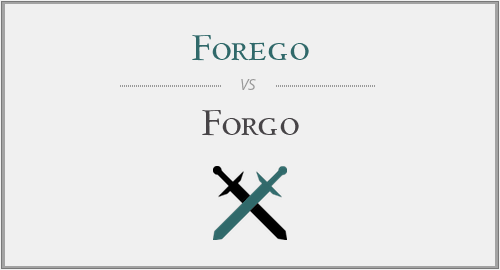While some believe that “forego” and “forgo” are perfect synonyms, other claim that they have completely different meanings. If these two paronyms managed to confuse you really badly, then don’t let mixed opinions and different unspecialized explanations trick you even further with this matter.
You’ve come to the right place to check whether “forego” and “forgo” are correct spellings and what signification each word carries. The best way to understand and remember the correct meaning and use of a word is to check in in the dictionary. We are always checking words in multiple sources and notorious dictionaries, to make sure we offer you the most accurate explanations and clear instructions regarding lexical meanings and grammatical functions. So how about “forego” and “forgo”? Check below!
Forego vs. Forgo
Broadly, we all know that both “forego” and “forgo” are two verbs that have formed from the verb “to go”, with the suffixes “fore-“, respectively “for-“. And while most people already know that “forgo” is somehow a synonym for “skip”, referring to giving up on something, the confusion appears because of the structure of “forego”. Many believe that the suffix “fore-“ is coming from the preposition “before”. This is also why they consider “that forego” means “going before”, to “go/walk before” someone else. But this is just a simple confusion.
The fact that “fore-“ is ending the same as “before” is not anything else, but a coincidence. In fact, dictionaries assure us that “forego” is simply another spelling for “forgo”, carrying exactly the same meaning and being used in just the same contexts, with identical purposes and grammatical functions. Check the examples below so you see how exactly these words are used in sentences and conversations.
When do we use “forego”?
“Forego” is defined as another spelling for “forgo”, referring to the action of giving up on something, deciding not to have or do something, even though you want to do or have that thing.
Example: I had to forego my ambition to become a marathon runner, after my accident last year. – “forego” means deciding not to do something despite the desire to do it.
When do we use “forgo”?
“Forgo” can be used just as “forego”, with the same meaning. It means renouncing to do or have something and deciding to cancel it, despite the desire to do or have it.
Example: I had to forgo my ambition to become a marathon runner, after my accident last year. – “forgo” means deciding not do so something and giving up on it, despite wanting that thing.
Conclusion
Despite the belief that “forego” means “going before”, the word is actually a total synonym for “forgo”. Both forms are simply different spellings for the same concept, the same action with the same meaning and grammatical function. You can use both versions without any concern, because both are correct and have the same signification in any context!





Have a discussion about this article with the community:
Report Comment
We're doing our best to make sure our content is useful, accurate and safe.
If by any chance you spot an inappropriate comment while navigating through our website please use this form to let us know, and we'll take care of it shortly.
Attachment
You need to be logged in to favorite.
Log In